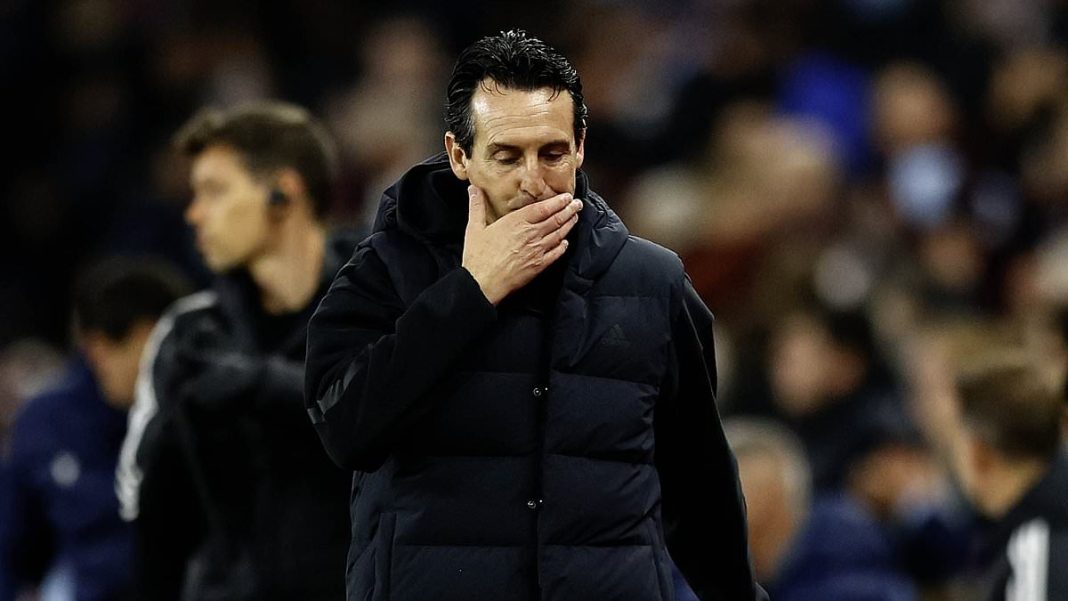- Erling Haaland remained an unused substitute with injury problems piling up
- City now have one less competition to focus on having been knocked out the cup
- LISTEN NOW: It’s All Kicking Off!, available wherever you get your podcasts. New episodes every Monday and Thursday
An absolute refusal to send for Erling Haaland told the story. The last remaining unbeaten run in the whole of England and Europe’s biggest leagues is finally over, at the end of October, but of more importance to Manchester City was no more injuries.
It is eight stricken first-team stars and counting after a costly night when, for all the inexperience out there, Tottenham preyed on the older heads to set up a quarter final meeting with Manchester United.
A crestfallen Savinho looks like he’s done his ankle and Manuel Akanji complained of meniscus pain in the warm up, adding to the absence of Kevin De Bruyne, Jack Grealish, the new Ballon d’Or winner and a few more.
Pep Guardiola needs that international break quickly but has three games to navigate before then. Three long trips, too – Bournemouth and Brighton sandwiching Sporting in the Champions League.
By the end of their Carabao Cup campaign in north London, City had 11 fit established senior outfield professionals on their books. It might be fewer if the treatment administered to Josko Gvardiol at full time indicates another issue.
‘We’re in trouble,’ Guardiola said. ‘I’ve never had this situation in nine years. We don’t have alternatives. I went to the massage table but it was too busy. Tomorrow we have two keepers and Erling to train. It’s been getting more difficult game by game but maybe one day we will be altogether.’
And yet, with a team half made up of kids at the end, they almost forced penalties.
Teenager Jacob Wright twice went close, another teenager Nico O’Reilly was thwarted on the goal line by Yves Bissouma. City were actually better for the additions of youth but couldn’t quite complete a comeback against a club whose manager Ange Postecoglou has heaped pressure on himself to lift something this year. ‘I’m really optimistic and bullish about this group, they’ve got a high ceiling,’ the Australian said. ‘We’re growing, developing. I’ve seen progress but we’re going to have stumbles along the way.’
Their opening goal, after only five minutes, will make 18 other teams in the Premier League smile. Spurs manoeuvred a half-baked City press, four passes from goalkeeper Guglielmo Vicario to Timo Werner sweeping past Stefan Ortega. Rival managers will have noticed Nathan Ake not pushing on to Archie Gray in the build-up and certainly jot down how Dejan Kulusevski left Ilkay Gundogan for dust. Still, it required a perfectly zipped cross by the Swede – cutting out Rico Lewis – to find Werner.
Gundogan gifted Werner another chance, misplacing a pass straight at him, but the effort was weak. Yet Spurs had a second midway through the first half. Again, a nicely planned move. Again, suspect defending.
No away player fancied racing out to meet Pape Sarr, 25 yards from Ortega, after Spurs had worked a short corner. With room to breathe, Sarr wonderfully bent round a jogging Matheus Nunes into the near post. The only real issue for Postecoglou up until that point was the worrying hamstring injury that reduced Micky van de Ven to tears as he trudged off. Werner later hobbled out too.
City reduced the deficit seconds before the break. Nunes has stepped up a level in recent weeks and looked City’s main threat even before marching onto a super Savinho ball towards the back stick.
Brennan Johnson and Werner should have added a third between them in what became a mini-classic. End-to-end, suiting Spurs, and Kulusevski ought to have made the game safe.
City rallied, debutant centre half Jahmai Simpson-Pusey peerless off the bench, yet the lack of real appetite to embarrass Spurs – because given the circumstances, that is what a result would have amounted to – was obvious as their hulking No 9 sat on the bench. He didn’t even go for a jog down the touchline.









